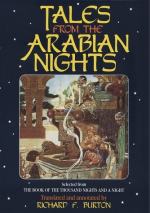[FN#125] Arab. “Tafazzal,” a most useful word employed upon almost all occasions of invitation and mostly equivalent to “Have the kindness,” etc. See vol. ii. 103.
[FN#126] The Shaykh for humility sits at the side, not at the “Sadr,” or top of the room; but he does not rise before the temporal power. The Sultan is equally courteous and the Shaykh honours him by not keeping silence.
[FN#127] Arab. “Miat Mamluk kitabi,” the latter word meaning “one of the Book, a Jew” (especially), or a Christian.
[FN#128] This Ms. prefers the rare form “Al-Jann” for the singular.
[FN#129] These flags, I have noticed, are an unfailing accompaniment of a Jinn army.
[FN#130] Ms. vol. iii. pp. 203-210; Scott, “Night Adventure of the Sultan,” pp. 68-71. Gauttier, Aventure nocturne du Sulthan, vi. 214.
[FN#131] Arab. “Mashrut shadak.” Ashdak is usually applied to a wide-chapped face, like that of Margaret Maultasch or Mickle-mouthed Meg. Here, however, it alludes to an accidental deformity which will presently be described.
[FN#132] Arab. “Amsik lisana-k”: the former word is a standing “chaff” with the Turks, as in their tongue it means cunnus-penis and nothing else. I ever found it advisable when speaking Arabic before Osmanlis, to use some such equivalent as Khuz=take thou.
[FN#133] This is the familiar incident in “Ali Baba”: Supplem. vol iii. 231, etc.
[FN#134] Ms. iii. 210-214. Scott’s “Story of the broken-backed Schoolmaster,” vi. pp. 72-75, and Gauttier’s “Histoire du Maitre d’ecole ereinte,” vi. 217. The Arabic is “Muaddib al-Atfal"=one who teacheth children. I have before noted that amongst Moslems the Schoolmaster is always a fool. So in Europe of the 16th century probably no less than one-third of the current jests turned upon the Romish clergy and its phenomenal ignorance compared with that of the pagan augur. The Story of the First Schoolmaster is one of the most humorous in this Ms.
[FN#135] For the usual ceremony when a Moslem sneezes, see vol. ix. 220.
[FN#136] The “day in the country,” lately become such a favourite with English schools, is an old Eastern custom.
[FN#137] Ms. iii. 214-219. Scott’s “Story of the wry-mouthed Schoolmaster,” vi. pp. 74-75: Gauttier’s Histoire du Second Estropie, vi. p. 220.
[FN#138] In these days the whole would be about 10d.
[FN#139] Pay-day for the boys in Egypt. The Moslem school has often been described but it always attracts the curiosity of strangers. The Moorish or Maroccan variety is a simple affair; “no forms, no desks, few books. A number of boards about the size of foolscap, whitewashed on either side, whereon the lessons—from the alphabet to sentences of the Koran—are plainly written in large black letters; a pen and ink, a book and a switch or two, complete the paraphernalia. The dominie,




